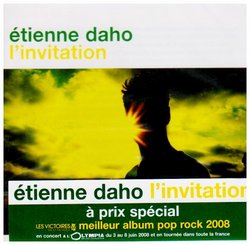| All Artists: Etienne Daho Title: L'Invitation (New Edition) Members Wishing: 0 Total Copies: 0 Label: EMI France Release Date: 9/16/2008 Album Type: Import Genres: International Music, Pop, Rock Styles: Europe, Continental Europe, Rock, Euro Pop, French Pop Number of Discs: 1 SwapaCD Credits: 1 |
Search - Etienne Daho :: L'Invitation (New Edition)
 | Etienne Daho L'Invitation (New Edition) Genres: International Music, Pop, Rock
|
Larger Image |
CD DetailsSimilar CDs
|
CD ReviewsMellow melancholy Terry Serres | Minneapolis, MN United States | 01/25/2008 (4 out of 5 stars) "Étienne Daho remains a compelling figure on the French music scene, and his most recent album is a solid effort if not an indelible experience.
I find it interesting that French pop can accommodate deeper, masculine voices that seem alien to Anglo-American tastes. I may stand to be corrected, but one might have to go back as far as Elvis Presley to find a true baritone in the American pop pantheon. (Maybe it was the masculinity of his voice, rather than his hip-shaking, that was so arousing!) Sure, we had Barry White and Lou Rawls, but they were relegated to soul and viewed almost as parodies of themselves. The French on the other hand, have long lionized their baritones: Trenet, Bécaud, Dassin, Lavilliers, and Daho. This album has a very confessional tone. It seems to follow the life cycle of a relationship--not in any rote, linear fashion ... but in the untidy, sometimes rash, sometimes uncertain way that relationships really progress. Musically, it relies less on melody than on a sustained rueful mood, strong lyrics imbedded in concise harmonic ideas and the rhythm of language. In his unforced hipness, Daho's voice embodies a serene intensity that defines this album--with close miking and an astute feel for language that transcends mere emoting. Daho's indebtedness to The Velvet Underground is once again apparent, yet the instrumentation and production have a clean sound. By these means, the album weaves from mellow to melancholy and back again. Only a couple of the songs make vivid melodic impressions: "Cet air étrange," which in itself depicts the bipolar trajectory of a romance, is powerful in its direct simplicity. "Sur la terre comme au ciel" has a nice rhythm and a retro hook. Also catchy is the slow-dance groove of "La Vie continuera," with its cynical play on the idea that "j'ai fait c'que j'ai pu avec c'que t'as pas" (I did what I could with what you didn't have)--an echo of the refrain from "Les mauvais choix" from the album Corps et Armes. (Another song here, "Obsession," indeed sounds like an abandoned track from the sessions for that album.) Two songs are especially haunting, the morose "L'Adorer" and the mysterious "Boulevard des Capucines." For all that, the final song, "Cap Falcon" leaves us on a hopeful if tentative note. This isn't the kind of album I usually go for (hence the four stars), but the intimacy of the vocals made it work for me. The lyrics contribute much to the album's strength, so I'm not sure it would interest listeners who aren't proficient in French unless they're already fans. (The booklet includes full texts in French.) " |

 Track Listings (11) - Disc #1
Track Listings (11) - Disc #1


